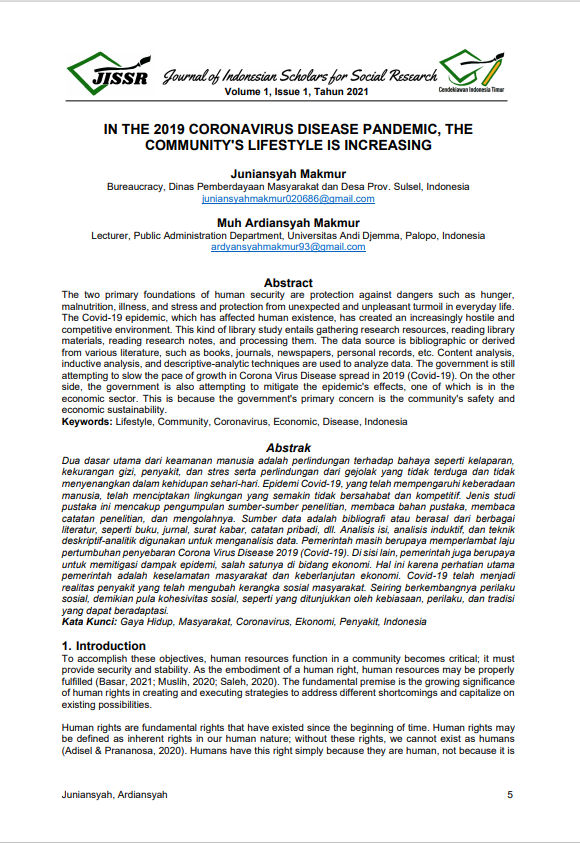In the 2019 Coronavirus Disease Pandemic, The Community's Lifestyle is Increasing
Keywords:
Lifestyle, Community, Coronavirus, Economic, Disease, IndonesiaAbstract
The two primary foundations of human security are protection against dangers such as hunger, malnutrition, illness, and stress and protection from unexpected and unpleasant turmoil in everyday life. The Covid-19 epidemic, which has affected human existence, has created an increasingly hostile and competitive environment. This kind of library study entails gathering research resources, reading library materials, reading research notes, and processing them. The data source is bibliographic or derived from various literature, such as books, journals, newspapers, personal records, etc. Content analysis, inductive analysis, and descriptive-analytic techniques are used to analyze data. The government is still attempting to slow the pace of growth in Corona Virus Disease spread in 2019 (Covid-19). On the other side, the government is also attempting to mitigate the epidemic's effects, one of which is in the economic sector. This is because the government's primary concern is the community's safety and economic sustainability.
Downloads
References
Adisel, A., & Prananosa, A. G. (2020). Penggunaan Teknologi Informasi dan Komunikasi dalam Sistem Manajemen Pembelajaran pada Masa Pandemi Covid 19. ALIGNMENT: Journal of Administration and Educational Management, 3(1), 1–10.
Anshori, I. (2020). Dampak Covid-19 Terhadap Proses Pembelajaran Di Mts Al-Asyhar Bungah Gresik. Islamic Management: Jurnal Manajemen Pendidikan Islam, 3(02), 181–199.
Basar, A. M. (2021). Problematika Pembelajaran Jarak Jauh Pada Masa Pandemi Covid-19:(Studi Kasus di SMPIT Nurul Fajri–Cikarang Barat–Bekasi). Edunesia: Jurnal Ilmiah Pendidikan, 2(1), 208–218.
Esthi, R. B. (2020). Strategi Sumber Daya Manusia di Masa Pandemi dan New Normal Melalui Remote Working, Employee Productivity, Dan Upskilling For Digital. JPM: Jurnal Pengabdian Masyarakat, 1(1), 22–24.
Herliandry, L. D., Nurhasanah, N., Suban, M. E., & Kuswanto, H. (2020). Pembelajaran pada masa pandemi covid-19. JTP-Jurnal Teknologi Pendidikan, 22(1), 65–70.
Makmur, M. T., & Hadi, S. (2020). Strategi Pemulihan Perekonomian Terdampak Covid-19 Melalui Perencanaan Pembangunan Sumber Daya Manusia Unggul Berbasis Industri 4.0. Majalah Media Perencana, 1(1), 117–126.
Muslih, B. (2020). Urgensi komunikasi dalam menumbuhkan motivasi di era pandemi COVID-19. PENATARAN: Jurnal Penelitian Manajemen Terapan, 5(1), 57–65.
Nasution, N. H., & Wijaya, W. (2020). Manajemen masjid pada masa pandemi covid 19. Yonetim: Jurnal Manajemen Dakwah, 3(01), 84–104.
Nurhalimah, S. (2020). Covid-19 dan hak masyarakat atas kesehatan. SALAM: Jurnal Sosial Dan Budaya Syar-I, 7(6), 543–554.
Ri, B. K. D., Lt, G. N. I., & Subroto, J. J. G. (2020). Tantangan pelaksanaan kebijakan belajar dari rumah dalam masa darurat Covid-19.
Rosmadi, M. L. N. (2021). Inovasi dan Kreativitas Pelaku Usaha UMKM di Era Covid-19. IKRA-ITH EKONOMIKA, 4(2), 87–94.
Rusilowati, U. (2020). Praktek Manajemen Sumber Daya Manusia selama Pandemi COVID-19 pada Karyawan yang Bergerak di Sektor Formal di Indonesia. Jurnal Ilmiah MEA (Manajemen, Ekonomi, & Akuntansi), 4(2), 481–491.
Saleh, M. (2020). Merdeka belajar di tengah pandemi Covid-19. Prosiding Seminar Nasional Hardiknas, 1, 51–56.
Sandra, G. (2021). A Sociological Review of The Damaging Criminal Act. Journal of Indonesian Scholars for Social Research, 1(1), 1–4. https://ojs.ycit.or.id/index.php/JISSR/article/view/2
Sari, W., Rifki, A. M., & Karmila, M. (2020). Analisis kebijakan pendidikan terkait implementasi pembelajaran jarak jauh pada masa darurat covid 19. Jurnal Mappesona, 2(2).
Wahyono, P., Husamah, H., & Budi, A. S. (2020). Guru profesional di masa pandemi COVID-19: Review implementasi, tantangan, dan solusi pembelajaran daring. Jurnal Pendidikan Profesi Guru, 1(1), 51–65.

Downloads
Published
How to Cite
Issue
Section
License
Copyright (c) 2021 Juniansyah

This work is licensed under a Creative Commons Attribution 4.0 International License.
Authors who publish in this journal agree to the following conditions:
- Authors retain the copyright of their work while granting the journal the right of first publication. The published work is licensed under the Attribution-ShareAlike 4.0 International (CC BY-SA 4.0) license (https://creativecommons.org/licenses/by-sa/4.0/). This license permits others to share and adapt the work, provided that proper credit is given to the original author(s) and the journal as the initial publisher.
- Authors may establish separate, additional agreements for the non-exclusive distribution of their published work (e.g., depositing it in an institutional repository or including it in a book), as long as they acknowledge its original publication in this journal.
- Authors must sign a copyright transfer agreement once they have reviewed and approved the final proof provided by JISSR before publication.









